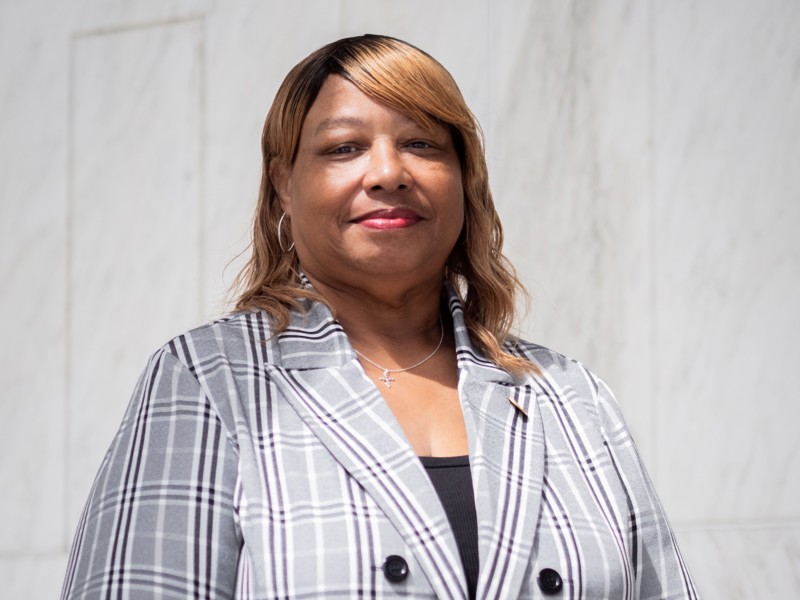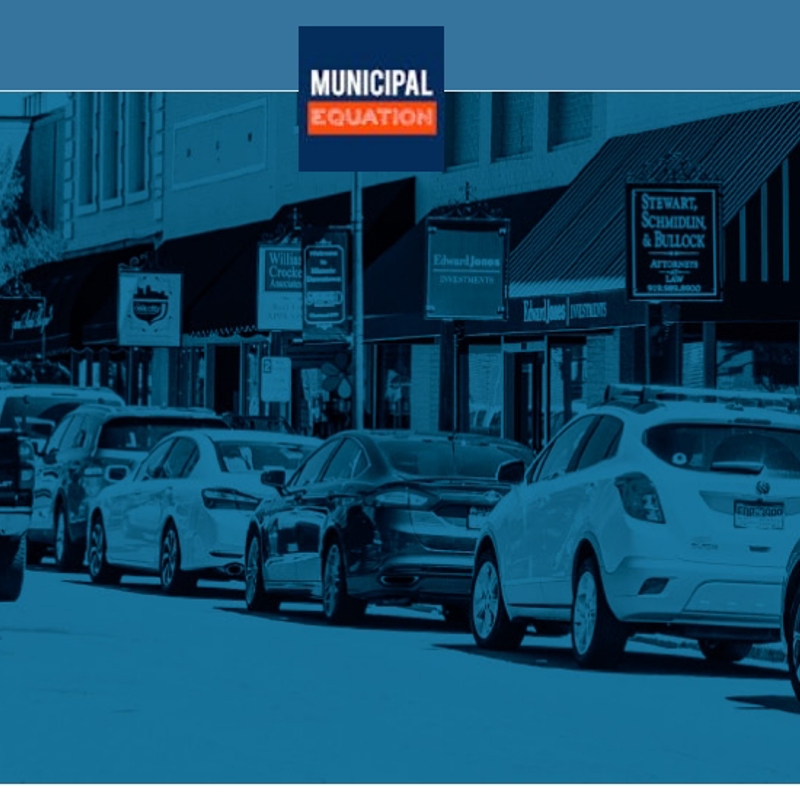At the Table: Rep. Gloristine Brown, a Former Mayor, Emphasizes Intergovernmental Connection
Q4 2024 | Vol. 74, Issue 4
One could fairly describe the N.C. General Assembly as the high level of government for North Carolina. It’s where the state’s laws are born, including those that affect how local governments operate. But, like with local government, elected office there doesn’t require any past experience with government service, which is only to say generally that elected officials at different levels of government can benefit greatly from good relationships and context-rich communication with one another. Rep. Gloristine Brown, who represents Pitt County’s District 8 in the NC House, appreciates this as much as anyone, herself a former municipal board member and mayor of Bethel who remembers many occasions in which healthy relationships and dialogue with state lawmakers helped with positive outcomes. Now serving in the state legislature, she’s keeping lines open with all kinds of stakeholders in order to vote with confidence and integrity toward a better North Carolina. Southern City recently visited Rep. Brown in her office at the Legislative Building in Raleigh, where she’s encouraging local-level officials to stay familiar.
As we’re speaking here today, you’re poised to enter a second NC House term. How are things going for you?
GB: I feel good. It’s been a little challenging because of the simple fact that, you know, being in the minority party and just being straightforward that there are a lot of things that you want to see done, but because you’re in the minority, your chances are not good right now on getting bills passed. And I am the type of person that could work across the aisles if need be, and with anyone, but I’m going to support and think about my constituents when I’m making choices and decisions on how I vote for any bill.
Right, when you come to an issue that needs a vote, you might have people generally aligning one way or another on it, but you of course invest time into the context and effects for your people back home.
GB: When you get a bill that hits you, you reach out to the resources you have, and sometimes I will go to colleagues and talk with people back home, actually talking to constituents. I just go up to someone and say, “Look, what do you think about XYZ?” And they’ll give me their thought, but I’m truly trying to think as a whole: this will affect my district and also the people of North Carolina.
How does that kind of mentality factor into your awareness of or sensitivities to needs in your district?
GB: My district is pretty rural. I have some areas in Greenville and over by East Carolina University and a little bit over by Winterville. But to think about the small areas, the small towns that really have a hard time getting the resources that they need and the process that you have to go through just to get the funding or fundings that you need for your area, and how you’re overlooked and how you really have to speak up. And then, I have never been one that, like the state, to send all these mandates without funding. I mean, in serving as mayor, we would get something that would come down from the state and it was like, “Okay, is there an appropriation with this?” And you’ve got to figure it out, you know, you’ve got to do this. And my thought is—and I’ve always said—one size does not fit all. And a lot of times when I notice that things are passed and the requirements that may work for the Charlottes and the Mecklenburgs, but you’re going to give us the same instructions for a Bethel or a Farmville. It doesn’t match. And so that is what causes a lot of our towns to miss out on what we probably could get if they (lawmakers sponsoring bills) would just change some of the wording or how the format is.
It makes sense, having prior experience in roles like mayor of a small town like Bethel, that you would see the sensitivities in things like unfunded mandates or language in bills that clearly wasn’t intended for your context. How do you address that? Do you find other colleagues in the legislature with that experience too?
GB: Yes, I do, especially experienced ones. I go to people, the veterans up here, they are good and on both sides. And if it’s something that I know that they can give me some insight on, and I have talked with them and they will tell me, “Okay, I think this might work,” or, “No, that’s something that you may need to wait on because right now that would be not a good idea.” And I have no problem with that. And also, to make sure that I try to reach out if it’s something that I think is going to affect one of my areas. I reach out to the county, I reach out to people to get their thoughts. I’ve talked to law enforcement to say, “What do you think about this? How do you feel about this? Give me some insight.” And they have been a really big help to explain some of this stuff to me, from being on the local level versus being on the state level, where the playing field is a lot bigger for sure.
What was your experience like in moving from municipal elected office to state legislative?
GB: To be honest, it was a little scary, because, like I said, I thought I was dealing with a lot on the local level. But when I got here, I was like, oh, this is the NFL now (laughter). You know, I left high school, I skipped college and came straight to the NFL. And I was like, oh God, my playbook is a whole lot heavier now. So, I definitely got to learn some things. So, it was scary, but, you know, I have to give it to the League. Because, with the League, we would always have our events (including the Town & State Dinners that pair municipal leaders with their General Assembly partners and other, past League events at the Legislative Building, like Town Hall Day) where we always interact with our legislators, and because of that, I was able to get to know some of the legislators here already. And so that was a little bit easier for me, because they had remembered me. So that actually helped me a lot.
That’s so great to hear, that those experiences helped with your transition, getting into the NFL, so to speak. Because now, of course, you’re dealing with myriad issues that may have local significance but also from different parts of the state as well as issues that are statewide in nature.
GB: Yeah, I’m seeing more into our environment, and education has gotten deeper than what I was looking at before. And so, just learning even more about how the monies are appropriated, the funds, and being on these different (legislative) committees and learning how the dollars are actually being appropriated to these different organizations or to these different communities. It’s just a big learning experience. And then understanding how the actual bill gets started, the process to actually get it to where it needs to be. On the (House) floor, when we came up for our orientation, we were taken through a mock session, even with the speaker (Rep. Tim Moore at the time of this writing) coming in with us. And it moves fast—you really have to listen and pay attention. And I do appreciate the way that we have our caucus; you go into caucus meetings right before you go on the floor for session, to go into and discuss the calendar for the day. And so, if there are any questions or any concerns or anything, those are times that you can ask the questions. But, at the same time, you still reach out to your resources outside to make sure that you kind of coincide. I pray a lot, too. I just want to make sure that I’m doing the right thing. And I do realize that some things that I may make a decision on are things that not everybody’s going to like. But at the end of the day, I want to feel like that I’ve reached most of the people, that most of them are going to appreciate the decision that I have made.
Can you give us some more thoughts on that? On how you’re obviously not going to be able to please every last stakeholder, but you are expected to have a voice or be a voice on the issue potentially, which might be especially sensitive. How do you deal with that?
GB: Right, people might say, “Well, I saw where you voted a certain way,” and they may have feelings about it, and I’ve had to really try to explain to them why I made my decision. And it is no more than when I was in (local government). And there were things I did not support as a commissioner and there were times when I wouldn’t vote for the budget. But I had to let people understand and know that there were things in the budget that I supported, but overall there were some things that were in there that I just could not stamp my name on. And it’s not that I’m not supporting this, this and this. It’s just when it’s all in one budget or proposal, when you have something that really stands out, that is what I’m voting against, not everything. So that is how I have to explain. And once I explain that to people and give them my view, usually they’re okay. So, it helps people to know, it gives them context to understand how it really works. And that is what I look for. We may not see eye to eye. We are not all going to see eye to eye. But I just want you to know why I did what I did, and I can feel like I’ve done my job and made sure I didn’t just do it because somebody told me to. The idea is good outcomes, as much as we can create them.
Do you enjoy the work in the House?
GB: I actually do. First of all, just the interacting with my colleagues. Because, like I said, I can get along with them, even on the other side. I have been asked to do the prayer twice on the floor and did that. I love seeing when we can come together on various fields. Some we won’t, but when we’ve done something that I know that’s going to help people, that makes me feel good.
What advice would you give to colleagues at the local government level in being effective with their legislators, the General Assembly overall, having good communication between local and state governments, and so on?
GB: First of all, for me, it was getting involved, more involved, in ways that put me in places where I could reach my legislators. I think you need to visit your legislators. I never thought that I would be in this position (in the House) this soon. I have thought about it, but at one point I thought, “Wow, that’s probably somewhere I would never be.” And then it happened. So, I think on the local level, if you’re serious about your position as being an elected official and want to help your community as well as the state, get more involved. (While serving as mayor) I knew my legislators and I had their direct contact. I was able to call. I would visit, and when I came to Raleigh, I did not just visit my legislators; I would pop in and just introduce myself. Because, at some point in time, they will remember you.
So, develop a good rhythm of contact that shows you’re the kind of official who’s there, appreciates the hard work, and keeps local government at the table.
GB: Just continue to stay involved. Continue to talk. Continue to be at the table by any means. It’s time for us as local elected officials to stop being on the menu and it’s time for us to be at the table. One of the biggest, greatest things that I said that I feel good about when I left as mayor, is the town commission and the town manager, we were able to get that deal with Greenville Utilities to come in and take over our water and sewer. Because that was a struggle for us. Being a small town with a very small tax base. And they kept saying that we were not charging enough and what else can you do? You can’t keep getting loans, and if your town is not growing, who’s going to pay it? So, I think being involved and realizing that we had to be at the table in order for that to happen. And when we were at the table, it happened. So, I encourage my colleagues, my friends that are serving on the local level, to really get more involved with your legislators and your neighbors, and other legislators. I mean, let people know what’s going on. Because you have a lot of people that may be in this position (in the legislature) that have never served in government before. So, you can’t expect them to know what’s going on in your town or in your city if you don’t tell them. They need to hear from you. And if they prefer me not to be a part in order to get something from my district, I have no problem backing away, as long as I know it will happen. That’s me. I’m just here to do the work and to keep learning and to be proud of my district, my town, my county and my state.









